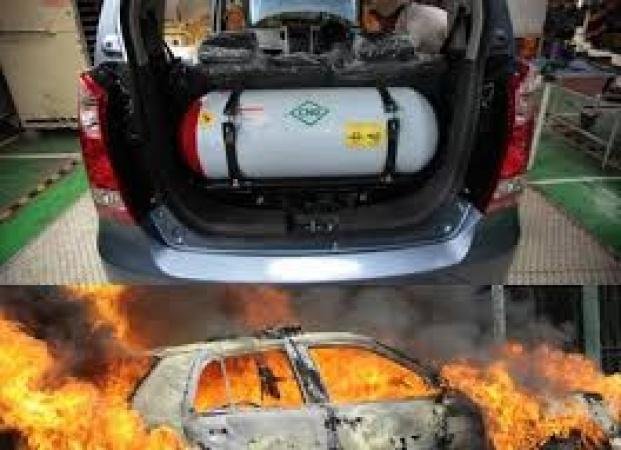Nigerians have expressed concerns over the safety of the Compressed Natural Gas converted vehicles following recent explosions involving some vehicles.
They raised questions about the safety standards and regulatory oversight of the conversions.
In May, the Minister of State for Petroleum Resources (Gas), Ekperikpe Ekpo, led a delegation of the Federal Government on a visit to the scene of a CNG truck explosion at Ita-Oshin, Abeokuta, Ogun State.
The truck belonging to Gascon Marine Limited exploded and claimed one life, while about six vehicles and two shops were burnt.
Ekpo also cited a second explosion, which he said involved another CNG-powered vehicle in Port Harcourt, Rivers State.
The latest explosion in Benin, Edo State, caught the attention of many Nigerians who were considering converting their petrol-powered vehicles to CNG.
The Edo incident, which occurred at a NIPCO CNG station at Ikpoba Hill, left two people injured.
According to NIPCO Gas, the cylinder installed in the vehicle was later identified as a fake, fabricated, substandard unit not designed for CNG, adding that it exploded after refill with around four standard cubic metres of gas.
The driver was said to have fled the scene immediately after the incident that left two persons injured.
“While no fatalities were recorded, two individuals sustained injuries. One person suffered a leg injury, and another sustained an eye injury. Based on the attending doctor’s recommendation, one of the individuals will require surgery at a different hospital. Our team is ensuring they receive the necessary care and treatment,” NIPCO Gas said in a statement made available to our correspondent.
Nigerians expressed concerns over how safe CNG is particularly in a country like Nigeria where extreme weather conditions and poor vehicle maintenance can exacerbate safety issues.
Netizens also took to X (formerly Twitter) to express worry over the safety of adoption of CNG-powered vehicles.
The Federal Government has, however, allayed fears among Nigerians that the CNG is unsafe for vehicles.
The FG adopted gas as its transitional fuel at a time when the world is seeking an alternative to fossil fuels.
When President Bola Tinubu came on board, he removed fuel subsidy, a decision that caused the price of petrol to rise above the purchasing power of ordinary Nigerians, now at an average of N1,000 per litre.
As the economic hardship continued to bite harder, Tinubu set up the Presidential Compressed Natural Gas Initiative for the promotion of CNG as a cheaper alternative to petrol and diesel.
For months, the PCNGI intensified efforts to ensure Nigerians converted their vehicles to CNG to reduce the cost of transportation.
The Programme Director/Chief Executive of PCNGI, Michael Oluwagbemi, assured Nigerians that CNG was safe.
Speaking in a brief chat with our correspondent, Oluwagbemi noted that the owner of the car in the Edo explosion did not get his cylinder from an authorised government dealer.
He disclosed that the car owner contacted a welder, who assisted him in fabricating a fake cylinder.
“CNG is safe. We know what happened in Edo. The driver contacted a welder to get a substandard fabricated cylinder. The regulators are on it,” he said.
In a statement on Friday, Oluwagbemi said, “The Presidential CNG Initiative notes the unfortunate incident that involved an illegally modified vehicle at a NIPCO CNG Station at Ikpoba Hill in Benin City on Wednesday, October 16, 2024.
“The PCNGI commiserate with those injured in this avoidable incident and is thankful that no lives were lost. The PCNGI also notes that the safe handling of all hydrocarbons is critical to their safe use.
“A close examination of the cylinder in question in Benin City shows it was welded and modified and not approved for use for CNG. The police, regulatory authorities and management of NIPCO are undertaking a painstaking investigation of the incident and we are coordinating with them,” he stated.
![]()










